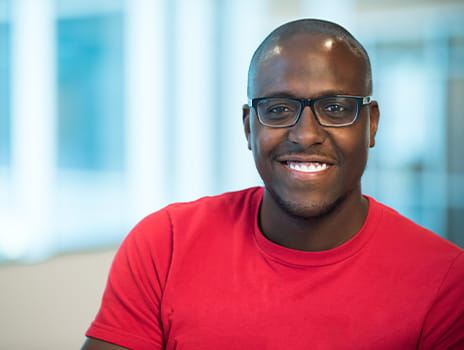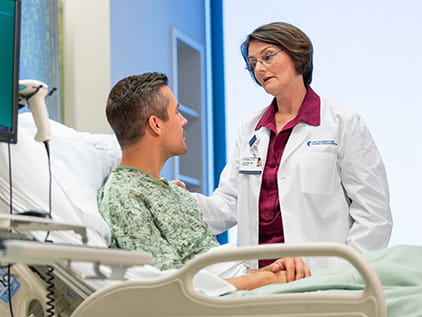Collaborative Care Restores Sight


December 03, 2018
Reggie Peoples didn't necessarily have moves before his brain surgery, but with Michael Jackson playing on his wife's phone and his kids' hands in his, he found reason to dance in the hospital room after it.
An 8-year journey for Reggie, now 34 years old, culminated with the minimally invasive endoscopic removal of a pituitary tumor that had increasingly obstructed his optic nerve.
Years in Chicago provided exciting opportunities for the Kansas City, Kansas, native. Reggie studied fashion merchandising at the Art Institute of Chicago and lived in a condo on the iconic Lake Shore Drive. He met Jill, who hailed from Michigan and became his wife. The couple welcomed a son, Roman, nicknamed their "Windy City Baby." In 2009, the young family returned to Reggie's roots in Kansas City.
But the Peoples family didn't settle down as easily as Reggie and Jill had envisioned. Instead, Reggie, working in business development for a sign company, began to experience severe vision problems. When tests conducted by his optometrist and 3 different retinal specialists revealed nothing wrong with his eyes, Reggie sought help at The University of Kansas Health System.
An MRI and CT scan quickly revealed the source of Reggie's vision problems: He had a pituitary tumor.
"It was terrifying," Reggie says. "It was an extremely rapid process. I was sent home to pack a bag and was back for surgery the next day."
Reggie's neurosurgery care team was able to remove about 50% of the tumor.
While relieved to learn the tumor was not cancerous and glad to have the surgery behind him, Reggie faced continued health challenges.
The next 6 years included the joy of welcoming daughter Chloé to the family, but also brought continued deterioration in Reggie's eyesight. Eventually, his left eye functioned at just 25% of normal and his right eye at 20%. He could not drive well. He could not do his best work. But he tried to press on.
"I felt that I couldn't put my wife under stress," Reggie says. "If I could not work, the financial stability of our home would be jeopardized. That's what was on my mind, as a husband and a father."
A professional who relied on a computer, Reggie found he had to close his right eye entirely to see anything at all. This created further strain on his left eye, as it worked to compensate for the closed eye. During this time, Reggie was not under a physician's care.
"That was a vital mistake, I know now," Reggie says. "My vision loss became intolerable. My head was cloudy. I was in a constant state of confusion. But, out of ego, I was still driving."
Ultimately, it was Reggie's struggle to drive that sent him back for medical help. While behind the wheel one night, he struck a parked vehicle he could not see.
"It was the last straw," he says. "We were so thankful that I was alone in the car and no one was hurt. It was the wake-up call I needed."
Reggie returned to The University of Kansas Health System, where an MRI revealed the tumor had returned, now larger than a golf ball and larger than it had been at the time of the prior surgery. Reggie again saw a neurosurgeon who provided encouraging news.
"I was told about a team at the health system using new technology to offer a new procedure," Reggie says. "I was truly impressed that my surgeon was humble enough to refer me to someone else here he thought could help me better. I have great admiration for the way he put my best interests first."
The procedure recommended was an innovative, minimally invasive approach in which Reggie's tumor would be removed through his nostrils via endoscopic surgery. This exemplified the powerful benefits of the multidisciplinary care practiced by The University of Kansas Health System. It would involve the collaboration of neurosurgeon Roukoz Chamoun, MD, and otolaryngologists, each bringing specialized skills to an advanced procedure.
On March 31, 2017, Reggie had the pituitary adenoma removed. Physicians navigated the endoscope through Reggie's nasal passages to reach the tumor. The approach required minimal incisions and offered faster healing, reduced pain, reduced risk of infection and better functional and cosmetic results.
"Dr. Chamoun is extremely knowledgeable," Reggie says. "What he did was an absolute game-changer for me."
The day after brain surgery, Reggie was not only walking, but dancing.
"I'm really not much of a dancer," Reggie says. "But my wife jokingly asked me if I could, so I grabbed my kids' hands, and I did. That was a defining moment for me. To be up and dancing with my kids the day after a brain operation. What an amazing thing."
Following the surgery, Reggie's vision improved rapidly. He continues to see an endocrinologist to regulate his pituitary gland's hormone production. The tumor and surgery can disrupt normal function, resulting in either overproduction or underproduction of the hormones that influence the behavior of other organs in the body. This care requires focus and fine-tuning and adjustments over time.
Reggie is continuing to recuperate, but is again safely behind the wheel and considers himself "99½ percent healed." He was in the right place at the right time to achieve a positive outcome.
"This team and this procedure changed my life," he says. "Before, I couldn't see my wife blow me a kiss. I couldn't see my kids' faces when they laughed. Now, I'm living my whole life in high definition. I was cloudy for too long, and now I have awakened."
He credits his care team with supporting him through a crucial turnaround.
"This procedure changed night into day for me," Reggie says. "This is truly the best hospital in the nation. Their heart for people is absolutely amazing."

We offer a variety of appointment types. Learn more or call 913-588-1227 to schedule now.